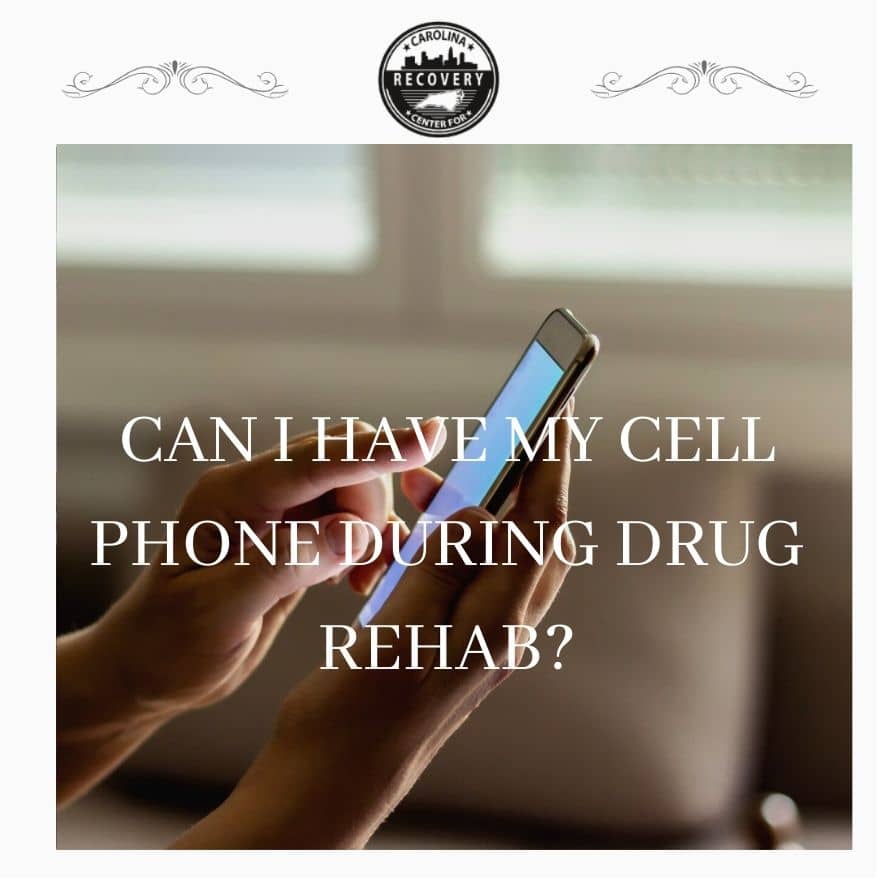Yes, you may be allowed to have your phone in rehab, depending on the rehab center’s policy. However, there may be restrictions on its usage.
It’s important to check with the rehab facility to understand their specific rules and guidelines regarding the use of phones during the treatment process. Entering rehab can be a daunting and overwhelming experience, and being able to stay connected with loved ones through your phone can provide a source of comfort and support.
However, it’s crucial to recognize the potential distractions and negative influences that phone usage can bring, especially during the rehab process. We’ll explore the benefits and drawbacks of having a phone in rehab, as well as the common guidelines that rehab centers may have in place for phone usage.

Credit: libertyhouserecoverycenter.com
Understanding the Policy on Phones In Rehab
Learn more about the policies surrounding phone usage in rehab facilities and whether having your phone is permitted during treatment. Understanding these guidelines is crucial for a successful rehab journey.
Understanding the Policy on Phones in RehabThe use of technology has become such an integral part of our daily lives that it’s almost impossible to imagine going a day without our smartphones. However, when it comes to rehab, the rules and regulations around phone usage are quite different. So, what is the policy on phones in rehab? Let’s delve into this topic by understanding the importance of phone policies, as well as the typical rules and regulations that govern phone usage during rehab.The Importance Of Phone Policies
In rehab, phone policies play a crucial role in creating a controlled and distraction-free environment that promotes recovery. One of the primary reasons behind the restricted use of phones is to ensure that individuals are fully focused on their treatment and therapy sessions. These restrictions prevent the temptation of accessing social media, texting friends, or scrolling through endless notifications, which could hinder the recovery process. Moreover, excessive phone usage can also lead to isolation from the rehab community, hindering opportunities for support and connection with peers who are going through similar experiences.Typical Rules and Regulations
Rehab facilities typically implement specific rules and regulations regarding phone usage to maintain a structured environment. While the policies may vary from one facility to another, there are some common guidelines that are often adopted. These rules can include:1. No Phones Allowed: Some rehab centers adopt a strict policy of not allowing phones at all. This means that individuals entering rehab will have to surrender their phones upon admission. By completely removing phones from the equation, these facilities aim to create an environment with minimal distractions, allowing individuals to focus solely on their recovery.2. Limited Phone Access: Other rehab centers may have a more flexible policy where individuals are permitted to have their phones but with restricted usage. This may include designated phone hours during the day or limited access to certain features like calls and texts, while other functions like internet browsing and social media are disabled.3. Supervised Usage: In certain cases, rehab centers might allow individuals to use their phones but under strict supervision. This means that staff members will monitor phone usage and ensure that it is in line with the established guidelines and does not interfere with the individual’s progress or the overall treatment environment.4. Personal Responsibility: Rehab facilities that follow this policy place the responsibility of phone usage on the individuals themselves. They are expected to practice self-discipline and make responsible choices when it comes to using their phones. This approach allows individuals to have their phones at all times but emphasizes the importance of using them in a balanced and mindful manner.Understanding the phone policy in rehab is crucial for individuals seeking treatment. It helps individuals prepare themselves mentally for the restrictions they might face during their recovery journey. By adhering to these policies, individuals can make the most of their time in rehab, fully immersing themselves in the treatment process and increasing their chances of long-term success.
Credit: carolinacenterforrecovery.com
Impact Of Phones on the Rehabilitation Process
The use of phones in rehab can have a significant impact on the overall rehabilitation process. Understanding how phones affect individuals undergoing rehab is crucial in determining their efficacy in the recovery journey.
Distracting Influence
Phones can serve as a major distraction to individuals in rehab, diverting their attention away from therapy sessions and recovery activities.
Social and Emotional Impact
Excessive phone use can lead to social and emotional detachment, hindering the formation of meaningful connections with peers and therapists.
Alternatives to Personal Phones In Rehab
Discovering alternatives to personal phones in rehab is a crucial aspect of the recovery journey. While the use of personal phones is restricted in rehab, therapeutic activities, group sessions, and outdoor exercises are offered to replace the need for constant phone use, promoting a healthy and focused environment for recovery.
Structured Communication Times
Structured communication times in rehab help individuals to maintain contact with their loved ones while ensuring a balanced approach to treatment and recovery.During these designated periods, patients can actively communicate with their family and friends through supervised channels provided by the rehab facility.Having set times for communication can promote a sense of routine and predictability, which is crucial in the rehabilitation process.Therapeutic Use Of Technology
The therapeutic use of technology in rehab involves utilizing electronic devices for educational, therapeutic, and entertainment purposes to support the recovery journey.Certain rehab programs incorporate therapy apps, virtual support groups, and online resources to enhance the treatment experience.Technology can also be used to access educational materials, mindfulness apps, and mental health resources that aid in the healing process.By leveraging technology in a therapeutic manner, individuals in rehab can enhance their coping strategies and emotional well-being.Balancing Privacy and Safety Concerns
In rehab, one of the questions that often arises is whether or not patients are allowed to have their phones with them. While the use of smartphones during treatment can have its benefits, it also poses challenges when it comes to finding the right balance between privacy and safety concerns. Let’s delve deeper into the confidentiality issues involved and the potential risks that having a phone in rehab may present.
Confidentiality Issues
Confidentiality plays a crucial role in the rehab process, as it creates a safe and trusting environment for individuals seeking recovery. Having a phone can significantly affect this confidentiality. Here are some important factors to consider:
- Limited Control: Allowing patients to have their phones means surrendering some control over their communication and privacy. This can potentially compromise their confidentiality and hinder the effectiveness of the treatment.
- Privacy Breach: Cell phones have the potential to facilitate unauthorized communication with individuals outside of the treatment center, leading to privacy breaches. This can jeopardize the progress made during the rehab program and expose patients to unnecessary risks.
- Data Security: Storing personal information and treatment-related data on a phone poses a risk of data breaches. Despite the best security measures, phones can be lost, stolen, or hacked, potentially exposing sensitive information.
The rehab facility must carefully consider these confidentiality issues and implement measures to maintain a secure and confidential environment for patients.
Potential Risks
While it may be tempting to allow patients to have their phones for various reasons, it’s important to acknowledge and understand the potential risks involved. Here are a few risks to consider:
- Distractions: Smartphones are notorious for their ability to distract and consume hours of a person’s time. Allowing patients to have their phones might hinder their focus and dedication to their recovery journey.
- Triggering Content: The unrestricted use of phones can expose individuals in rehab to triggering content, such as social media posts or messages from people associated with their addiction. This can disrupt their progress and lead to relapse.
- Outside Influence: Having a phone can create the opportunity for outside influences, such as drug dealers or toxic acquaintances, to reach out to patients, which can be detrimental to their recovery.
By understanding and addressing these potential risks, rehab facilities can protect their patients’ privacy, ensure their safety, and create an environment conducive to successful recovery.
Supporting Family Communication
Family Involvement In Treatment
Having your phone in rehab can play a crucial role in supporting family communication and involvement in treatment. While being in rehab, staying connected with family members can provide emotional support and encouragement, ultimately contributing to the individual’s recovery process.
The Role Of Visitation
Visitation serves as a valuable opportunity for family members to physically engage with their loved ones in rehab. It can provide a sense of comfort and familiarity, reinforcing the individual’s motivation to progress in their treatment. The positive impact of visitation on an individual’s mental well-being cannot be overstated.
Embracing Technology In Therapy
Digital Therapeutic Tools
Therapy in today’s world is evolving, embracing innovative digital therapeutic tools. These tools, including apps, online platforms, and wearable devices, can complement traditional therapy by providing additional support and resources. Utilizing digital therapeutic tools can enhance the overall therapy experience for individuals in rehab, promoting engagement, accountability, and progress tracking.
Benefits Of Controlled Technology Use
Controlled technology use in rehab can offer several benefits. When utilized mindfully, technology can provide a gateway to valuable resources, educational materials, and support networks. It allows individuals to stay connected with their loved ones and access positive, motivational content. Moreover, controlled use of technology enables individuals in rehab to practice time management, self-discipline, and accountability, which are crucial skills for their successful recovery journey.
Designing Effective Phone Use Guidelines
Are you wondering if you can keep your phone during rehab? This article provides effective guidelines for phone use in rehab facilities and discusses the impact it can have on your recovery journey.
When it comes to phone use in rehab, it’s crucial to have guidelines in place to ensure a productive and therapeutic environment. These guidelines provide structure, setting clear expectations and outlining consequences for violations. Designing effective phone use guidelines is instrumental in helping individuals focus on their recovery without unnecessary distractions. In this section, we will explore two key aspects of designing these guidelines: customizing policies for different programs and establishing clear expectations and consequences.
Customizing Policies for Different Programs
Rehabilitation programs vary in their approaches and goals, necessitating the customization of phone use policies. It’s important to recognize that different programs have diverse needs when it comes to phone access. For instance, an intensive inpatient program may require stricter restrictions on phone use to promote full immersion in the recovery process. On the other hand, outpatient programs may permit more leniency to accommodate individuals who need to balance their treatment with work or other responsibilities.
In addition, the types of addiction being treated can influence phone use policies. Programs targeting substance abuse may have different guidelines compared to programs focused on behavioral addictions. By customizing policies based on program type and addiction type, rehab centers can optimize the effectiveness of their treatments and ensure that individuals receive the necessary support.
Clear Expectations and Consequences
Transparently communicating expectations and consequences is vital for maintaining a therapeutic environment. By establishing clear guidelines, rehab centers can help individuals understand what is expected of them regarding phone use. This clarity allows individuals to stay focused on their recovery journey and minimizes misunderstandings.
Moreover, it’s crucial to outline the consequences that individuals may face if they violate these guidelines. Consequences can range from temporary loss of phone privileges to additional counseling sessions or group therapy. Clearly defining these repercussions helps individuals understand the seriousness of adhering to the guidelines and reinforces the importance of their commitment to recovery.
In conclusion, when it comes to phone use in rehab, designing effective guidelines is a crucial step in creating a supportive and therapeutic environment. By customizing policies for different programs and establishing clear expectations and consequences, rehab centers can ensure a productive and distraction-free space for individuals to focus on their recovery journey.

Credit: whitesandstreatment.com
Ensuring Successful Reintegration after Rehab
In rehab, phone policies vary, impacting reintegration. Maintaining guidelines can assist successful rehabilitation post-treatment.
Managing Technology In Aftercare Plans
Reintegrating after rehab needs careful tech integration plans to support recovery.Strategies for Healthy Phone Use Post-rehab
Consider guidelines to ensure balanced and mindful phone usage after completing rehab.| Guidelines for Healthy Phone Use: | Description |
|---|---|
| Set Boundaries: | Establish limits on phone usage to maintain focus on recovery. |
| Engage in Real-life Activities: | Balance screen time with physical and social activities. |
| Mindful Usage: | Be conscious of when, where, and why you use your phone. |
| Limit Notifications: | Reduce distractions by turning off non-essential notifications. |
| Seek Support: | Connect with peers or support groups to navigate challenges. |
Conclusion
Having your phone in rehab can be a complicated matter, as it largely depends on the rehab facility’s policies. While some rehab centers allow limited phone use for communication and treatment purposes, others prefer a complete ban to create a distraction-free environment.
It’s crucial to prioritize your recovery and follow the rules set by the rehab facility to maximize your chances of success. Remember, rehab is a time for self-reflection and growth, away from the pressures and distractions of the digital world.
Focus on your healing journey, and the rest will follow.








